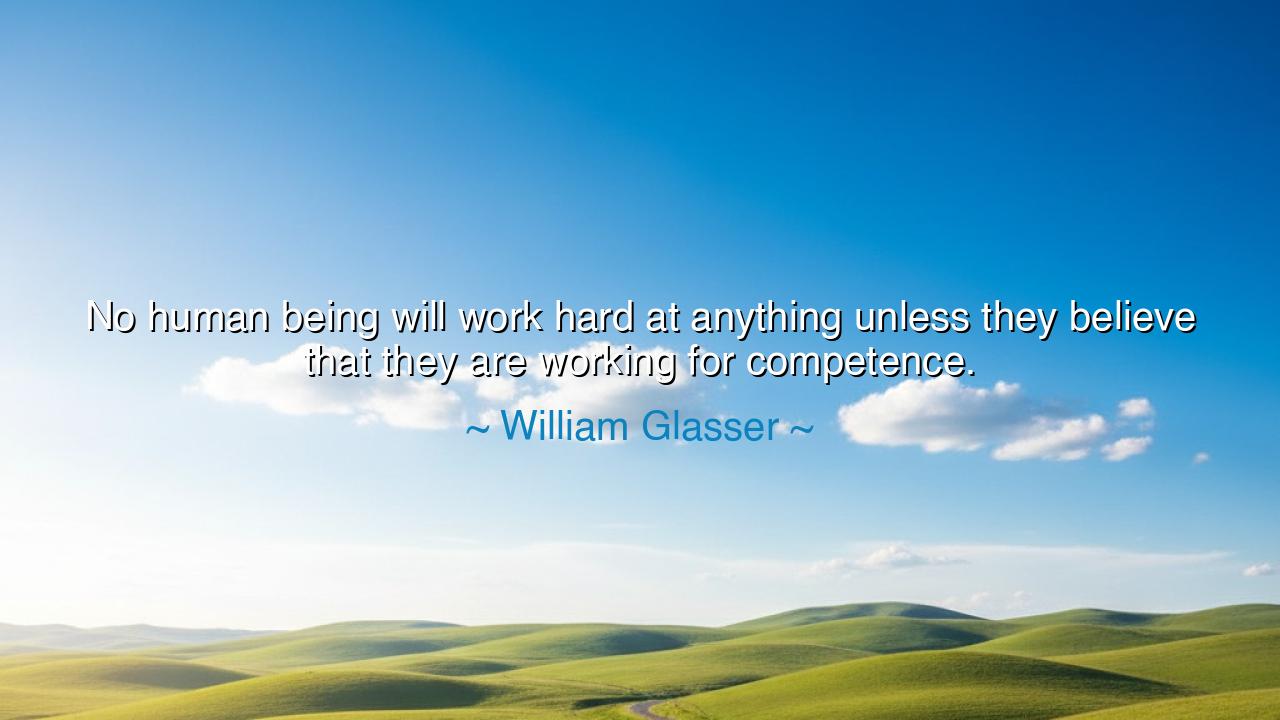
No human being will work hard at anything unless they believe
No human being will work hard at anything unless they believe that they are working for competence.






The words of William Glasser, “No human being will work hard at anything unless they believe that they are working for competence,” reveal a profound truth about the soul’s hunger for purpose. He teaches that labor without meaning soon collapses, and effort without hope of mastery turns to dust. The heart must believe that its striving leads somewhere — to skill, to growth, to the power of becoming capable. Without this vision, toil feels empty, and the spirit refuses to endure it.
To work hard is not only to sweat and strain but to give the fullness of one’s energy. Yet no man or woman willingly offers such effort unless they see before them the promise of competence — the assurance that each stroke of labor builds strength, each step forward increases ability, and each failure serves as a teacher. The ancients knew this well: the blacksmith bore the heat because he believed he would master iron; the scribe endured long hours because he sought mastery of words.
The longing for competence is tied to the dignity of being human. Animals may act by instinct, but the human being yearns to learn, to improve, to shape destiny through will. When one sees no path to mastery, despair arises; when one glimpses it, even the hardest road is bearable. Thus, belief becomes the fuel of perseverance.
So Glasser’s words stand as counsel to future generations: if you wish to awaken effort in yourself or in others, kindle the belief that true competence can be won. For no task is too great when the heart is convinced that growth is possible. Let it be remembered: the noblest labor is not for riches or applause, but for the mastery that makes the soul strong, wise, and free.






UGUser Google
This quote by William Glasser makes me think about how we define competence. Is it just about improving skills, or does it also involve confidence, recognition, and the sense of accomplishment? Can people work hard for competence even if others don’t acknowledge their growth? What role does external validation play in maintaining the belief that our efforts are making us more competent?
TVTrung Vu
William Glasser’s quote really resonates with the idea that purpose drives effort. If we believe that our hard work is developing our competence, we’re more likely to stick with it. But does this apply to all types of work, or is it mostly applicable in areas where skill development is visible and measurable? How do we find that belief in competence in jobs or tasks where progress isn’t so obvious?
TNTram Ngoc
I agree with William Glasser’s point about the connection between hard work and the desire for competence. It seems like many people are driven by the idea that their efforts will lead to improvement. But how often do we find ourselves working hard without a clear sense of whether we’re becoming more competent? How important is it for us to see tangible progress to keep pushing forward?
PCPhuong Chau
Glasser’s perspective on motivation is interesting because it emphasizes competence as a driving force for hard work. But what happens when people are unsure of their abilities or don’t see a clear path toward improving their skills? Can motivation still exist without the clear belief in gaining competence, or is that the only thing that truly drives effort in the long run?
TTuan
This quote by William Glasser speaks to the core of motivation. It makes me wonder, do we sometimes forget to communicate to others that their hard work is leading to mastery? Is it possible that we overlook competence as a key factor in motivating people? How can we shift from rewarding results to focusing more on the process and growth that comes with competence?